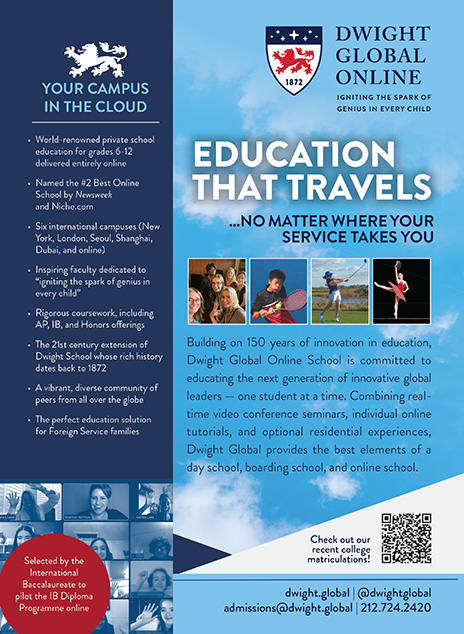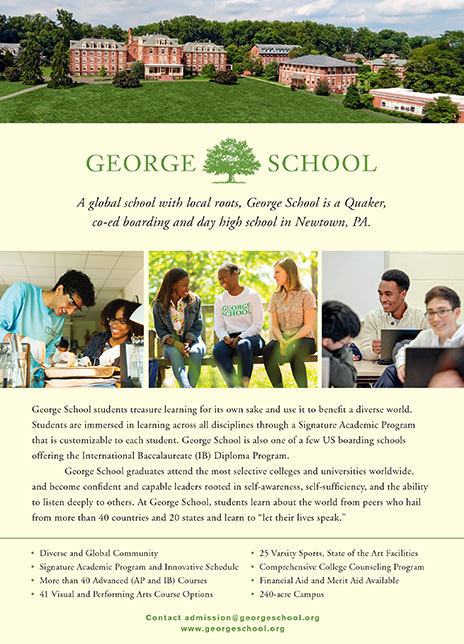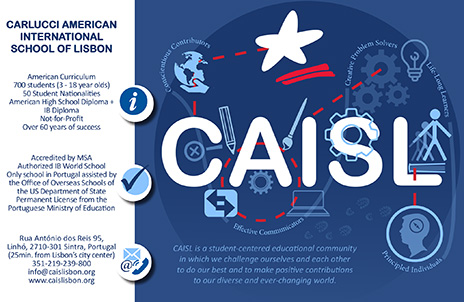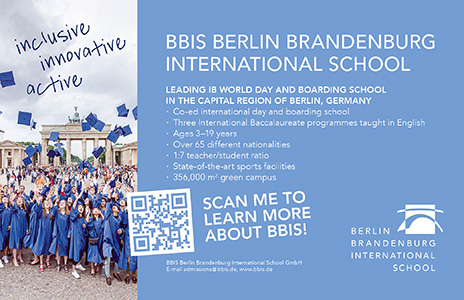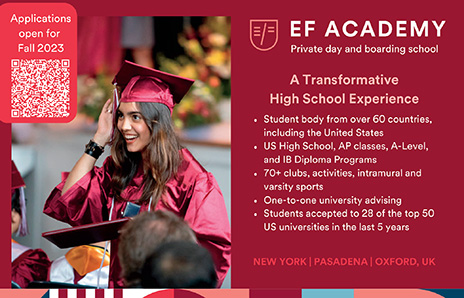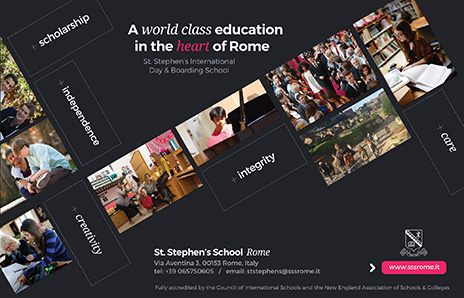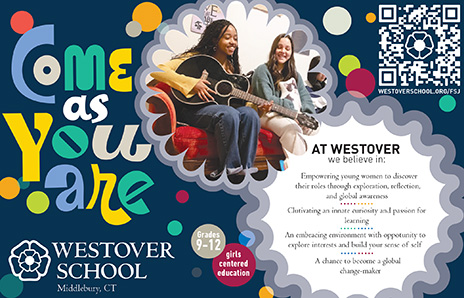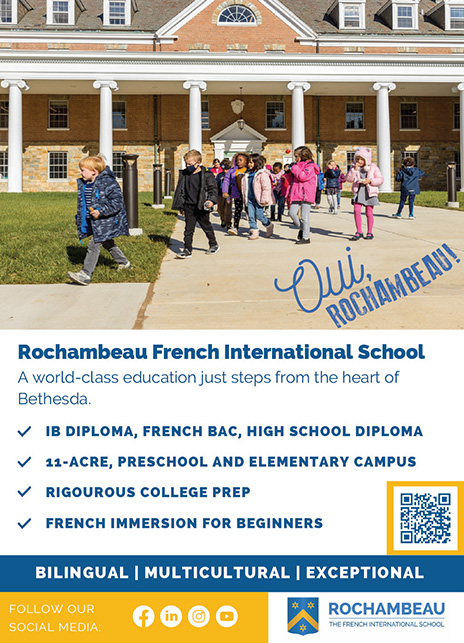Generative AI and the College Admissions Process
New technologies based on artificial intelligence are raising lots of questions for students and educators alike.
BY FRANCESCA KELLY
I stood outside the window, staring at my reflection in the glass. My brother’s face was just inches away on the other side, but it was like he was a million miles away. He was sitting in a hospital room, surrounded by white walls and beeping machines. It was hard to believe that just a few months ago, we were playing video games and teasing each other like we always did. Now, he was trapped in his own mind, unable to communicate with the outside world.
Does that paragraph draw you in and make you want to read more? That’s what I’ve traditionally coached my college application essay students to do with their writing: open with a “hook.”
But the above paragraph wasn’t written by one of my students, or even by a human being.
It was the first paragraph of an essay created by the generative artificial intelligence (AI) entity, ChatGPT, after I fed in the following prompt: “Write a 550-word college application essay in narrative form that tells a story about the writer’s experience visiting his schizophrenic brother in a mental hospital. The essay should open with a scene that is compelling, then go back and tell a little family history and the sibling relationship, and finish with insights about what the writer has experienced and what he has learned.”
As soon as I submitted this prompt, ChatGPT started writing in front of my eyes. The entire essay was done in less than a minute.
Not only that, but the essay was better than serviceable—it probably would have fooled many admissions officers.
Unless you’ve been living off the grid, you’re probably aware of the recent buzz about ChatGPT and other forms of generative AI.
Artificial intelligence has been around for a while, but since OpenAI made ChatGPT more accessible to the general public last fall, both usage and discussion about it have increased exponentially, especially among college counselors, admissions officers, high school teachers and university professors—and students.
And that’s just in the world of higher education. The conversations have gone far beyond that into AI-generated art, music, literature, inventions, and other applications. The questions range from big (“Is humankind opening Pandora’s Box?”) to small (“Can I use AI to help me write my college application essays?”).
In this article, we’ll confine our discussion to the latter topic. Phew.
What Exactly Is Generative AI?
Generative AI uses deep machine learning through neural networks to both create and evaluate original content such as text, images, and audio. In a recent interview on the “PBS News Hour,” Seth Dobrin, president of the nonprofit Responsible Artificial Intelligence Institute, said: “Think of it as auto-complete on steroids.”
He explained that generative AI comprises “large language or foundational models that are essentially trained on the whole of the internet.”
Because the internet offers factual information, disinformation, bias, and opinion, generative AI content can contain all of those things. It’s important to note that generative AI, depending on its purpose, also mines datasets of thousands of books and millions of images, as well as scientific and medical data.
Still, Dobrin pointed out, ChatGPT uses Reddit, a huge chat site with 50 million users, to learn how humans converse. And Reddit is nothing if not human. Also, GPT-4 was trained on data only through 2021, so it can produce outdated information.
Although there are several generative AI programs available, ChatGPT (GPT stands for Generative Pre-Trained Transformer) has captured the lion’s share of media attention. Other companies such as Google (whose AI tool is called Bard) and Microsoft (Bing) offer their own generative AI platforms.
If you give these new apps a spin, bear in mind that there are data privacy concerns about ChatGPT and other AI tools.
It’s Already Being Used to Write Essays …
Some college applicants have already used AI to generate college admissions essays, even at the risk of consequences. Can college admissions officers determine if an application essay is AI-generated? Without AI detection and other tools, that’s unlikely at this point. ChatGPT-generated essays have recently fooled expert readers.
The essays generated by those of us first testing out ChatGPT’s “skills” were good, but not necessarily great. In the essay I created above, there were not enough of the specific small details that show us something about the writer. There was more “telling” than “showing,” and a certain monotonous rhythm to the writing.
So, just a few months ago, the consensus was that a talented student could still write a more personal essay than what ChatGPT produced and that AI-generated essays, while very good, still lacked specific and unique details that would have made them … well, more human.
Then GPT-4 was released. And with that more sophisticated tool, the landscape is changing once again. I gave it a prompt for an essay about the writer’s love of fossils, and it generated a good—but again, not great—essay. I tweaked the prompt, asking it to mimic sample essays from different sources. Here, it did better.
How the prompt is written and tweaked makes a difference, and I’ve seen some essays generated by GPT-4 that use specific colorful details and show insight, vulnerability, and humor. Just as “deep fake” audio, video, and imagery are rapidly improving, so is generative AI’s essay fakery.
That said, generative AI can also produce a result that’s too polished, too sophisticated. That might raise red flags among college admissions officers.
And, really, they just want to get to know you better: who you are, what your values are, what you’ll bring to campus. Can an AI-generated essay show these things? That’s up for debate, but it’d be pretty ironic if you asked ChatGPT to generate an essay that showcases your honesty.
Admissions officers also want to know that you have good writing skills, because you’ll need those at college—where AI-savvy professors might require essays to be written in class by hand.
And generative AI can still get things wrong. I tried my earlier prompt, about the mentally ill brother, with the updated GPT-4. Surprisingly, this supposedly more sophisticated generative AI had some glitches: Even though I asked for 550 words, it generated a repetitive and trite 787-word essay. So, it’s not perfect. Yet.
So Why Should You Write Your Own Original Essays?
Ethics. Whether or not colleges or students consider it plagiarism to use generative AI to write for you, it’s still considered morally wrong to claim to have written something that you didn’t write.
Growth and self-knowledge. College Essay Guy Ethan Sawyer points out that using generative AI to write essays “doesn’t provide students the same opportunity for personal growth” they might otherwise have working with a coach or even on their own. “This process can serve as a sort of rite of passage, teaching students valuable insights about themselves along the way. I worry that AI may skip over that.”
Indeed, as an essay coach, I’ve helped students dig deep into their motivations and their values. You’ll embark on a journey of self-discovery if you keep asking yourself, almost like a 3-year-old, “Why?”
Why, in a room full of swim-team trophies, is the “most improved in calculus” certificate more important to you? Because I had to work so much harder at calculus. Why did you choose to work so hard? Because I needed to prove that I could master something difficult. Why did you need to prove this? Because I come from privilege and actually wanted to experience firsthand the rewards of sweating through an uncertain outcome.
When you approach your essays in this way, writing them becomes a deep and rich process that you’ll miss if you use generative AI. (Full disclosure: I have worked as an essay coach for College Essay Guy, as well as for several other companies.)
Can college admissions officers determine if an application essay is AI-generated?
Pride of accomplishment. Making the writing process easier is a tempting but temporary fix. Confidently knowing your capabilities is permanent. Brainstorming, structuring, writing a rough draft, and fine-tuning to write exactly what you want to write with depth and thoughtfulness—this process sends an important message to your psyche about your own resources and skills.
Using AI to write for you sends a very different message: that you’re not up for the job. That’s not the subliminal self-talk to carry through life. (However, this doesn’t mean that you can’t use AI to help you become a better writer. More about that later.)
Consequences. If the above reasons don’t resonate, there’s always this one: If you get caught lying about who (or what) wrote your essays, you may face some pretty bad consequences: a rescinded admissions offer; suspension or even expulsion from your high school; even loss of respect from those you care about.
How Well Can AI-Generated Essays Be Detected?
Scott Aaronson, a computer science professor at the University of Texas–Austin, and now a guest researcher at OpenAI, has been working on a digital “watermark” that signals AI-generated text. Several entities have also created AI detectors, although they vary in quality.
I sent the first two paragraphs of a ChatGPT-generated essay to three different AI detector sites: Crossplag.com, AIwritingcheck.org, and GPTZero.me. Only GPTZero, a program developed by Princeton computer science student Edward Tian, detected AI writing.
But with rapidly developing programs such as Turnitin, college admissions officers may soon be checking application essays with AI detection software.
As of this writing, administrators are still wary about using AI detectors in the college classroom. Says Betsy Barre, executive director of the Center for the Advancement of Teaching at Wake Forest University: “If [AI detection tools] are not accurate, then we shouldn’t use them.”
Anna Mills, a writing instructor and Open Textbook author at the College of Marin, agrees: “Some detection tools have given false positives that could lead to false accusations of cheating.” But she does think there might be a role for them, “if they are not used punitively but as part of student-teacher dialogue.”
Barre adds, “We need to protect our students who don’t cheat.” She points out that a professor “can ask a student to walk through how they came up with their ideas for a paper.”
A growing list of universities are crafting new honor code guidelines redefining plagiarism and clarifying that students may not claim AI-generated work as their own. Meanwhile, some professors are teaching students how to ethically use generative AI to help in their studies and writing.
The Positives: How Can Generative AI Help?
Despite the concerns cited above, let’s not be too hasty to hold a cross up against the “evil AI monster.” Generative AI can be extremely helpful—in coming up with course syllabi for professors, for example, or narrowing lists of prospective colleges for students. Here are just a few of the ways generative AI can streamline the college admissions process:
Generating an initial college list. This has traditionally been a somewhat tedious process, but generative AI can make it much faster. I asked GPT-4 to find me colleges that offered a major in journalism with a minor in musicology, a four-season environment, and an urban or suburban location.
In less than a minute, I had a list of five well-known universities (including my alma mater, Northwestern), with short descriptions of each—a much more efficient process than using search engines.
Planning a college tour. GPT-4 instantaneously produced a three-day itinerary, including approximate drive times, when I fed it the following prompt: “I live in Pittsburgh, and I want to visit the following colleges: Haverford, Gettysburg, Rutgers, Drew, SUNY Binghamton, and Ithaca College. Can you plan an itinerary for me where I visit no more than two colleges per day?”
Preparing for a college interview. Most college websites tend to be clunky, so using generative AI to learn more about a prospective college is a time-saver. It’s to your advantage to have researched specific departments and professors in which you can demonstrate interest (not only during an interview but also in a “Why Us?” essay). Ask generative AI to pinpoint the specific classes, clubs, facilities, activities, and professors that are fine-tuned to your interests.
Brainstorming essay topics. AI can find connections between your values, interests, and goals. For example, I asked GPT-4, “What are some connections that can be made between these interests: human anatomy, soccer, and mock trial?”
Using both the first response and a second regenerated response, I receive connections that included athletic functioning of the body, strategic/quick thinking, teamwork, preparation and discipline, as well as medical malpractice and sports malpractice issues.
I added character traits and values and got an even more thorough response. These could serve as a springboard for brainstorming essay content.
Outlining. If you’re unsure of how to structure your essay, give generative AI pertinent details and ask it to suggest an outline. Some essay coaches and teachers have already encouraged their students to do this.
Correcting/editing original writing. Although applications such as Grammarly do a good job finding errors in writing, ChatGPT can do even more. I fed it a paragraph filled with spelling, spacing, and grammatical errors, and it fixed them all, and made suggestions for new material to include, as well. (Google’s Bard did not do as well; it missed errors and just suggested general ways to improve writing.) My prompt was simply: “Make suggestions on how to improve the following paragraph.”
Though I did not use generative AI to write this article, I did ask ChatGPT if parts of the paragraph in which I define generative AI offered an accurate description. The answer was largely yes, with some clarifications, which I then fact-checked and used to revise those sentences.
How College Admissions May Change in the Face of Generative AI
This is being discussed on practically every high school and college campus right now. Ideas being circulated include reinstating essays as part of an in-person SAT or ACT; using AI detectors; and asking students to create a baseline, hand-written sample in class to a surprise prompt (no electronics allowed) that is then uploaded to the Common App or another application for colleges to use as a basis for comparison.
Administrators are scrambling right now to keep abreast of the rapid changes in generative AI and to come up with policies that are effective and ethical.
Will writing coaches turn into “prompt engineers”? For many of us, this crosses an ethical line, but it also makes us a little sad: We want our students to be not only good writers but also good thinkers. How will generative AI affect our critical thinking skills? Are we equipped to fact-check generative AI, just as we should fact-check social media?
As of this writing, generative AI is evolving so rapidly that it’s hard to know where it will take us. Consider this: It took Facebook six years to reach one billion monthly users; it took ChatGPT two months.
The large, even existential questions about generative AI are daily growing more urgent. But for the smaller questions—such as how to make use of AI ethically and efficiently to help you in the college admissions process—we’ve got some preliminary, exciting, and perhaps scary answers, with more to come.
When sharing or linking to FSJ articles online, which we welcome and encourage, please be sure to cite the magazine (The Foreign Service Journal) and the month and year of publication. Please check the permissions page for further details.
Read More...
- “The ‘Why This College?’ Essay” by Francesca Kelly, The Foreign Service Journal, June 2019
- “Can You Really Write All of Your College Application Essays Over the Summer?” by Francesca Kelly, The Foreign Service Journal, June 2020
- “Can Artificial Intelligence Crack College Admissions?” by Christopher Rim, Forbes, January 2023



